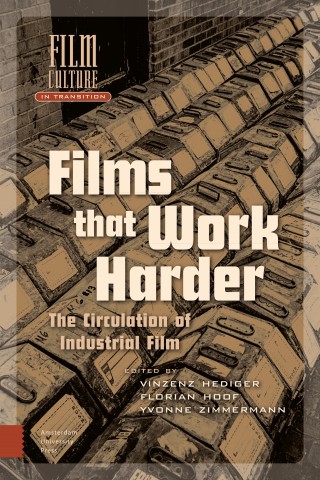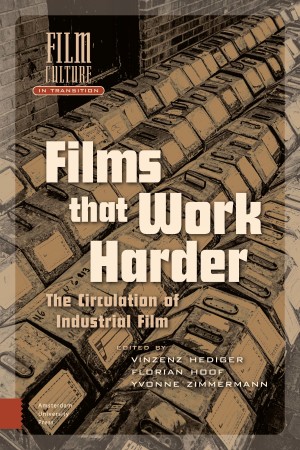Introduction: A sequel, and a shift – Vinzenz Hediger, Florian Hoof, Yvonne Zimmermann
Section 1 : Networks and Flows: Visualizing Value Chains
Vinzenz Hediger: The Aesthetics of the Global Value Chain. Container Shipping, Media Networks and the Problem of Visibility in the Global Sphere of Circulation
Lee Grieveson: Object Lessons and Infrastructural Imperialism
Thomas Turnbull: Energy and Industrial Film: energo-critical registers
Florian Hoof: The Afterlife of Industrial Film: Weak Dispositives, Choice Architecture, and the Contemporary Circulation of Industrial Cinema
Section 2: Operative Iconographies, Industry and the Nation State
Ira Plein: Beautiful Luxembourg, Steel Works, and a Swimming Pool. The Corporate Film Columeta and the Formation of a Corporate and a National Image.
Lucie Cesalkova: Hydropower for a Sealess Nation. Representation of Water Energy in Czech Visual Culture
Zimmer: Modern Water Sprites. History, Nature, and Landscape in Vattenfall’s Film Production in the 1950s
Takuya Tsunoda: Taxonomy of Techniques: Visions of Industrial Cinema in Postwar Japan
Yvonne Zimmermann: The Power of Flows: The Spatiality of Industrial Films on Hydropower in Switzerland
Section 3: Institutions and Distribution Frameworks: Archives, Festivals, Fairs
Steve Foxon: Industry on Screen: The British Documentary in Distribution. British Transport Films – A Case Study
Brian Jacobson: On the Red Carpet in Rouen: Industrial Film Festivals and a World Community of Film Makers
Haidee Wasson: Cinema and Industrial Design: Showmanship, Fairs and the Exhibition Film.
Section 4: Teaching Oneself and Others
Gregory A. Waller: Putting Films to Work: System, The Magazine for Business
Charles Acland: New Media for the Schools of Tomorrow. The A.V. Instructional Films of Robert W. Wagner
Guillherme Machado: We Must Know More than We Can See: Databases of Vocational Training
and the Emergence of Cognitive Ergonomics
Scott Anthony: Free enterprise film: Aims of Industry, economic propaganda and the development of a neoliberal cinema
Section 5: Post/Colonial Industries and Third Industrial Cinemas
Rudmer Canjels: Framing Local and International Sentiments and Sounds. Unilever and Royal Dutch Shell in a Changing Nigeria.
Tom Rice: Working Through the End of Empire
Ravi Vasudevan: Cinema-going on the Railway Tracks: Transportation, Circulation and Exhibition of Information Film in Colonial India
Salomé Aguilera Skvirsky: The Latin American Process Film.
Section 6 : Production Cultures and/of the Industrial Film: Amateurs and Professionals
Maria Vinogradova: Soviet Industrial Film Across Categories: Negotiating Between Utility, Art and Science
Luca Peretti: “There exists no life more daring and adventuresome than that of an oil drigger”.
Alexander Stark: Industrial Film from the Home Studio: Amateur Cinema and Low Budget Corporate Moving Image Culture in West Germany, from 1950 – 1977
Anna Maria Falchero: Movie and Industry in Italy: The “Golden Age” of Italian Industrial Documentary (1950-1970)
Alain Michel: A Film that Doesn’t Seem to Work: A Shot of Renault’s Early Assembly Line (1920 to 1929). A Case Study, Methodology and 3D Restitution for Film Analysis
Section 7: Ephemeral Artistry: Ecologies of Authorship in Industrial Cinema
Christian Bonah: Business and Art: Pharmaceutical Industries, Film Production and Circulation, and the French Film Production Company ScienceFilm, 1960-1980.
Patrick Russell: Transfer of Power: films officers in the British coal industry
Martin Stollery: Saudi Arabia’s John Ford? Robert Yarnall Richie, Desert Venture and Ephemeral Authorship in Industrial Film.
Annette Davison: Sounds Industrial: Understanding the Contribution of Music and Sound in Industrial Films
Alessandro Cecchi: Creative Films for Creative Corporations.

